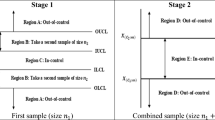Abstract
In Dai and Ho (1994) we developed a method, referred to asstructural infinitesimal perturbation analysis (SIPA), to address the need for derivative estimation with respect to a special type of parameter. However, it was not clear how much computational effort is required to implement this method. Derivative estimation via SIPA can be complicated in implementation. Such computational problems, also arise in several other derivative estimation methods. In this paper we take SIPA as a typical method and apply it to a special class of DEDS-several variations of single-server queues, focusing on the issue of implementation. We demonstrate that SIPA can be efficiently implemented. In some cases, it can be as simple as theinfinitesimal perturbation analysis (IPA), method which is considered to be the most efficient method available so far. The main approach we take is to combine SIPA with finite perturbation analysis and cut-and-paste techniques. Explicit formulae are given to various problems, some being impossible to solve using the traditional IPA method. Numerical examples are employed to illustrate the results.
Similar content being viewed by others
References
Bremaud, P. 1991. Maximal coupling and rare perturbation sensitivity analysis. Manuscript.
Bremaud, P., and Massoulie, L. 1993. Maximal coupling rare perturbation analysis with a random horizon. Manuscript.
Bremaud, P., and Vazquez-Abad, F. J. (1992). On the pathwise computation of derivatives with respect to the rate of a point process: The phantom RPA method.Queueing Systems 10, pp. 249–270.
Cassandras, C. G. 1993.Discrete Event Systems: Modeling and Performance Analysis. Homewood: Irwin/Aksen.
Cassandras, C. G., and Julka, V. 1992. Marked/phantom slot algorithms for a class of scheduling problems.Proc. 31 st Conference on Decision and Control, Tucson, AZ, pp. 3215–3220.
Chaudhry, M. L., and Templeton, J. G. C. (1983)A First Course in Bulk Queues. New York: Wiley.
Dai, L., and Ho, Y. C. 1994. Structural infinitesimal perturbation analysis (SIPA) for derivative estimation in discrete event dynamic systems.IEEE Trans. Automat. Control. To appear.
Fu, M., and Hu, J. 1992. Extensions and generalizations of smoothed, perturbation analysis in a generalized semi-Markov process framework.IEEE Trans. Automat. Control 37(10), pp. 1483–1500.
Glasserman, P. 1991.Gradient estimation via perturbation analysis. Boston: Kluwer.
Gong, W. B. 1988. Smoothed perturbation analysis algorithm for a G/G/1 routing problem.Proc. 1988 Winter Simulation Conf. (M. Abrams, P. Haigh, and J. Comfort, eds.), pp. 525–531.
Gong, W. B., Cassandras, C. G., and Pan, J. 1991. Perturbation analysis of a multiclass queueing system with admission control.IEEE Trans. Automat. Control 36(6), pp. 707–723.
Gong, W. B., and Ho, Y. C. 1987. Smoothed perturbation analysis of discrete-event dynamic systems.IEEE Trans. Automat. Control 10, pp. 858–866.
Ho, Y. C. 1987. Performance evaluation and perturbation analysis of discrete event dynamic systems.IEEE Trans. Automat. Control 32(7), pp. 563–572.
Ho, Y. C. 1992. Perturbation analysis: Concepts and algorithms.Proc. 1992 Winter Simulation Conf. (J. Swain, D. Goldsman, R. Crain, and J. Wilson, eds.), pp. 231–240.
Ho, Y. C., and Cao, X. R. (1991).Perturbation Analysis of Discrete Event Dynamic Systems, Boston: Kluwer.
Ho, Y. C., Cao, X. R., and Cassandras, C. G. 1983. Infinitesimal and finite perturbation analysis for queueing networks.Automatica 19, pp. 439–445.
Ho, Y. C., and Li, S. 1988. Extensions of the perturbation analysis techniques for discrete event dynamic systems.IEEE Trans. Automat. Control 33(5), pp. 427–438.
Ho, Y. C. and Strickland, S. 1992. A taxonomy of perturbation analysis techniques. InDiscrete Event dynamic Systems: Analyzing Complexity and Performance in the Modern World (Y. C. Ho, ed.). IEEE Press, pp. 207–212.
Kleinrock, L. 1975.Queueing Systems Vols. I & II. New York: Wiley.
Shi, L. 1994. Discontinuous perturbation analysis. manuscript.
Suri, R. 1989. Perturbation analysis: The state of the art and research issues explained via the GI/G/1 queue.Proc. IEEE 77, pp. 114–137.
Suri, R., and Cao, X. R. 1986. The phantom customer and the marked customer methods for optimization of closed queueing networks with blocking and general service times.ACM Performance Eval. Rev. 12(3), pp. 243–256.
Suri, R., and Zazanis, M. 1988. Perturbation analysis gives strongly consistent estimates for the M/G/1 queue.Management Sci. 34(1), pp. 39–64.
Vakili, P. 1990. Using uniformization for derivative estimation in simulation.Proc. Amer. Control Conf. pp. 1034–1039.
Vakili, P. 1991. A standard clock technique for efficient simulation.Oper. Res. Lett. 10, pp. 445–452.
Vakili, P., and Yu, G. X. 1993. Uniformization based sensitivity estimation for a class of stochastic discreteevent systems. Manuscript.
Vazquez-Abad, F. J., and L'Ecuyer, P. 1991. Comparing alternative methods for derivative estimation when IPA does not apply directly.Proc. 1991 Winter Simulation Conf., pp. 1004–1011.
Zazanis, M. A. 1988. Compensators and derivative estimation for queueing systems.Proc. 26th Allerton Conf. Communication, Control, and Computing, Urbana, Champaign, pp. 549–555.
Author information
Authors and Affiliations
Rights and permissions
About this article
Cite this article
Dai, L., Ho, Y.C. On derivative estimation of single-server queues via structural infinitesimal perturbation analysis. Discrete Event Dyn Syst 5, 5–32 (1995). https://doi.org/10.1007/BF01438605
Received:
Revised:
Issue Date:
DOI: https://doi.org/10.1007/BF01438605




